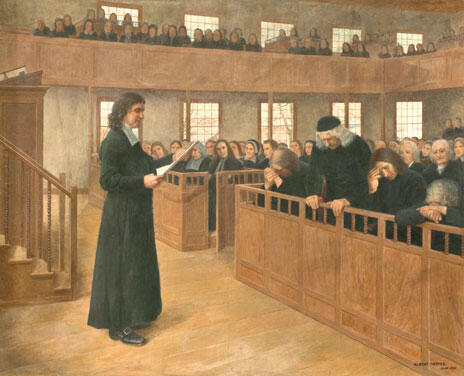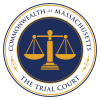- Trial Court Law Libraries

Image above: Public Repentance of Judge Samuel Sewall for his Action in the Witchcraft Trials by Albert Herter, 1942. (MALegislature.gov)
When process failed: Lessons from Salem
In 1692, fear and suspicion overwhelmed Salem Village. More than 200 people were accused of witchcraft, 30 were convicted, and 19 were executed. Historians caution that defective procedure—not divine justice—drove these outcomes. Fundamental rights now deemed essential were largely absent: no guaranteed counsel, reliance on “spectral evidence” (visions or dreams as proof), and pressure on accused persons to confess or testify against others.
Public outcry and judicial reconsideration followed. Judge Samuel Sewall later issued a public confession, desiring to “take the Blame and shame of it, Asking pardon of men...” and the colonial General Court formally expressed regret. These acts reflect early recognition that law must provide process, not just verdicts.
A turning point toward reform
The aftermath of Salem left a deep imprint on Massachusetts' legal culture. Colonial leaders began to question how courts should evaluate evidence, protect the accused, and prevent public fear from undermining fairness.
Over the next century, as the colonies evolved into a nation, the lessons of Salem became part of a broader conversation about rights and liberties. Massachusetts’ early legal codes drew increasingly from English common law traditions, emphasizing procedures such as trial by jury, rules of evidence, and the protection of property and life through established law.
The Massachusetts Constitution: Due process in ink
When Massachusetts drafted its 1780 Constitution, its Declaration of Rights enshrined procedural safeguards at the state level — protections that often go beyond federal minima.
Article XII stipulates:
“No subject shall be held to answer for any crime or offence, until the same is fully and plainly, substantially and formally, described to him … no subject shall be arrested, imprisoned, despoiled, or deprived of his … life, liberty, or estate, but by the judgment of his peers, or the law of the land.”
Article XV declares the right to trial by jury in civil controversies:
“In all controversies concerning property … the parties have a right to a trial by jury … this method of procedure shall be held sacred.”
These constitutional provisions have shaped Massachusetts jurisprudence, often providing a stronger baseline for procedural fairness than minimum federal due process standards.
Due process in today’s trial courts
In Massachusetts, due process extends beyond criminal law to civil, administrative, and family proceedings — always asserting the core requirement of notice, hearing, and impartial decision-making.
Today, Massachusetts courts incorporate procedural fairness into many concrete services. The Trial Court’s Office of Language Access (OLA) ensures that non-English speakers receive interpreters free of cost in court proceedings. OLA recruits, trains, certifies interpreters, and provides them in more than 140 court locations across the state.
Meanwhile, the Massachusetts Access to Justice initiative provides legal information, self-help materials, and support to self-represented litigants across the Commonwealth. The Trial Court Law Libraries support this mission by offering to the public free access to legal resources and helping individuals navigate statutes, case law, court rules, and forms — thereby enhancing their ability to participate meaningfully in court. Working in partnership, the Law Libraries and Court Service Centers ensure that court users can get the help they need. The Court Service Centers can answer basic questions, assist with court forms, and provide information about court rules, procedures, and practices. Together, these services promote access to justice by helping everyone better understand and engage with the court system.
Lessons from Salem: Vigilance, Fairness, and Participation
The horrors of the Witch Trials show what happens when fear replaces procedure and assumption overrides evidence. The Commonwealth’s evolution of due process — from those early injustices to modern constitutional guarantees and court practices — underscores that justice is an ongoing project, not a finished product.
Each time a court provides clear notice of charges, allows a paper or oral response, ensures meaningful access to interpretation or legal information, or safeguards unbiased decision-making, it honors those lessons. In Massachusetts, the story of due process is one of remembering Salem — and building institutions that prevent such miscarriages from ever recurring.
For further reading on this topic the MA Trial Court Law Libraries offer the following blogs:
- Witchcraft law up to the Salem witchcraft trials of 1692
- The Salem Witchcraft Trials
- Salem Witch Trials: Original Court Records
Resources
- “Salem Witch Trials”,Wikipedia.
- “The Laws Leading to the Salem Witch Trials,” New England School of Law.
- “How the Salem Witch Trials Influenced the American Legal System,” History.com.
- "Samuel Sewall Takes the Blame and Shame for the Salem Witch Trials," New England Historical Society.
Authored by Mitzi Krueger, Head Law Librarian at the Barnstable Law Library.
